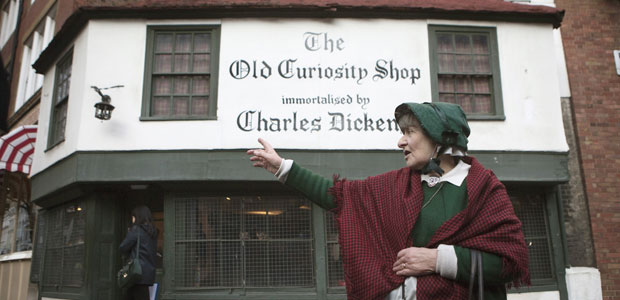What Charles Dickens was really saying
Known for his colourful characters with evocative names, the real aim of Charles Dickens was to improve society writes Beverley Cook, curator of the Dickens exhibition at the Museum of London.

As we celebrate the bicentenary of the author’s birth, we can acknowledge Dickens to have been the first, and arguably greatest, urban novelist. His novels and stories are like a giant atlas in which the metropolis has been imaginatively surveyed and mapped.
They track a changing society in an industrial age. Many aspects of his writing are profoundly unsettling, especially Dickens’s insistent descriptions of the terrible living conditions of the poor whose sufferings were largely ignored. He chronicled the impact of change on London as it grew into an at times monstrous city, as its population doubled in size.
Disorder and momentum
His novels convey the disorder and momentum of the capital city, but also the dark side of London that many would recognise today – its poverty, overcrowding and crime. He portrayed London as a divided city where “life and death went hand in hand; wealth and poverty stood side by side; repletion and starvation laid them down together”. But he also understood its irresistible lure, noting in Dombey and Son: “Day after day, such travellers crept past, but always … in one direction – always towards the town. Swallowed up in one phase or other of its immensity, towards which they seemed impelled by a desperate fascination, they never returned”.
Dickens’s aim was to reform and improve society through his writings.
Dickens’s aim was to reform and improve society through his writings. Through his training as a court reporter and journalist he came to despise creaking government bureaucracy (what he termed “red tape”) and incompetence, which he felt was partly responsible for the plight of the poor. He also condemned financial fraud and, in novels such as Bleak House, the protracted process of the legal system on which he commented: “The one great principle of the English law is to make business for itself.”
Campaigning journalist
As a campaigning journalist with a social conscience, Dickens investigated the prison system, suggesting reforms and condemning the spectacle of public executions that he witnessed. He also criticised the rudimentary education offered to the poor by the Ragged School system.
But, whilst in Our Mutual Friend he condemned the squalid buildings, overcrowding, inadequate teachers and infantile moral instruction offered by these schools, he was realistic enough to recognise they were better than nothing: “They who are too ragged, wretched, filthy, and forlorn, to enter any other place,” he wrote “who could gain admission into no charity-school, and who would be driven from any church door; are invited to come in here, and find some people not depraved, willing to teach them something, and show them some sympathy, and stretch a hand out, which is not the hand of Law, for their correction.” A further great concern was sanitary reform and how this could tackle disease and the conditions of the poor.
What would Dickens write about if he were alive today?
Wandering alone
Dickens often reflected that, as a child left wandering alone and unprotected through the streets of a wild and violent London, he might well have become “a little robber or a vagabond”. Such memories fuelled his concern for dispossessed and unprotected children evident in his writings, his support of children’s charities and his persistent attack on the 1834 Poor Law that began with Oliver Twist and continued through to Our Mutual Friend.
“So, they established the rule,” he wrote cynically in Oliver Twist of those who devised the law, “that all poor people should have the alternative (for they would compel nobody, not they), of being starved by a gradual process in the house, or by a quick one out of it.” Sadly, the inequalities of life remain with us as the poor become poorer and the rich richer.
Although Dickens aspired to “live in the Household affections, and to be numbered among the Household thoughts” of his readers, he also recognised that, even from his own experience of family life, that the domestic ideal was rarely achieved. Few of Dickens’s novels portray contented or stable family life.
Dysfunctional families
Several of his female characters fail to conform to the Victorian middle-class vision of virtuous womanhood and are depicted as “fallen women”. Within his novels there are 149 full orphans, 82 children with no father, and 87 with no mother. Only fifteen named characters in the major works had two parents, and in nearly half of these cases their families were fractured. Dysfunctional families and their associated social problems are not just a symptom of the 21st century.
Dysfunctional families and their associated social problems are not just a symptom of the 21st century.
Sadly, inequalities and poverty still exist in London, still blighting lives. Dickens’s words still challenge us today: “I saw that not one miserable wretch breathed out his poisoned life in the deepest cellar of the most neglected town, but, from the surrounding atmosphere, some particles of his infection were born away, charged with heavy retribution on the general guilt.”
From A December Vision, Household Words, 1850